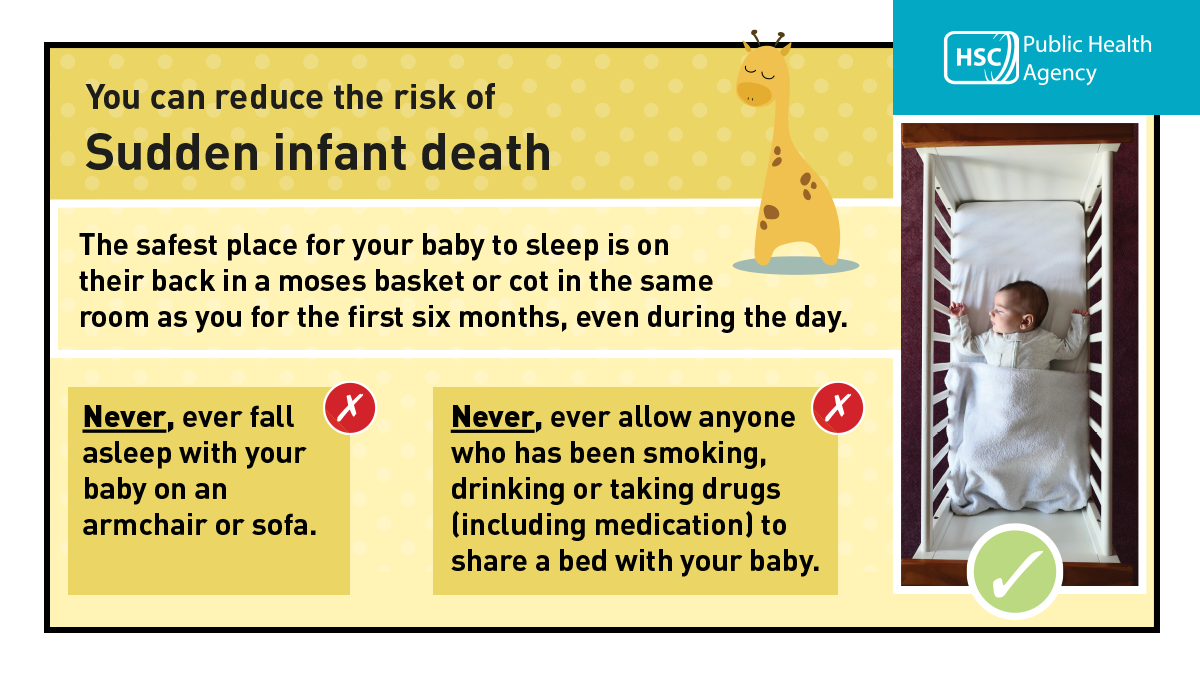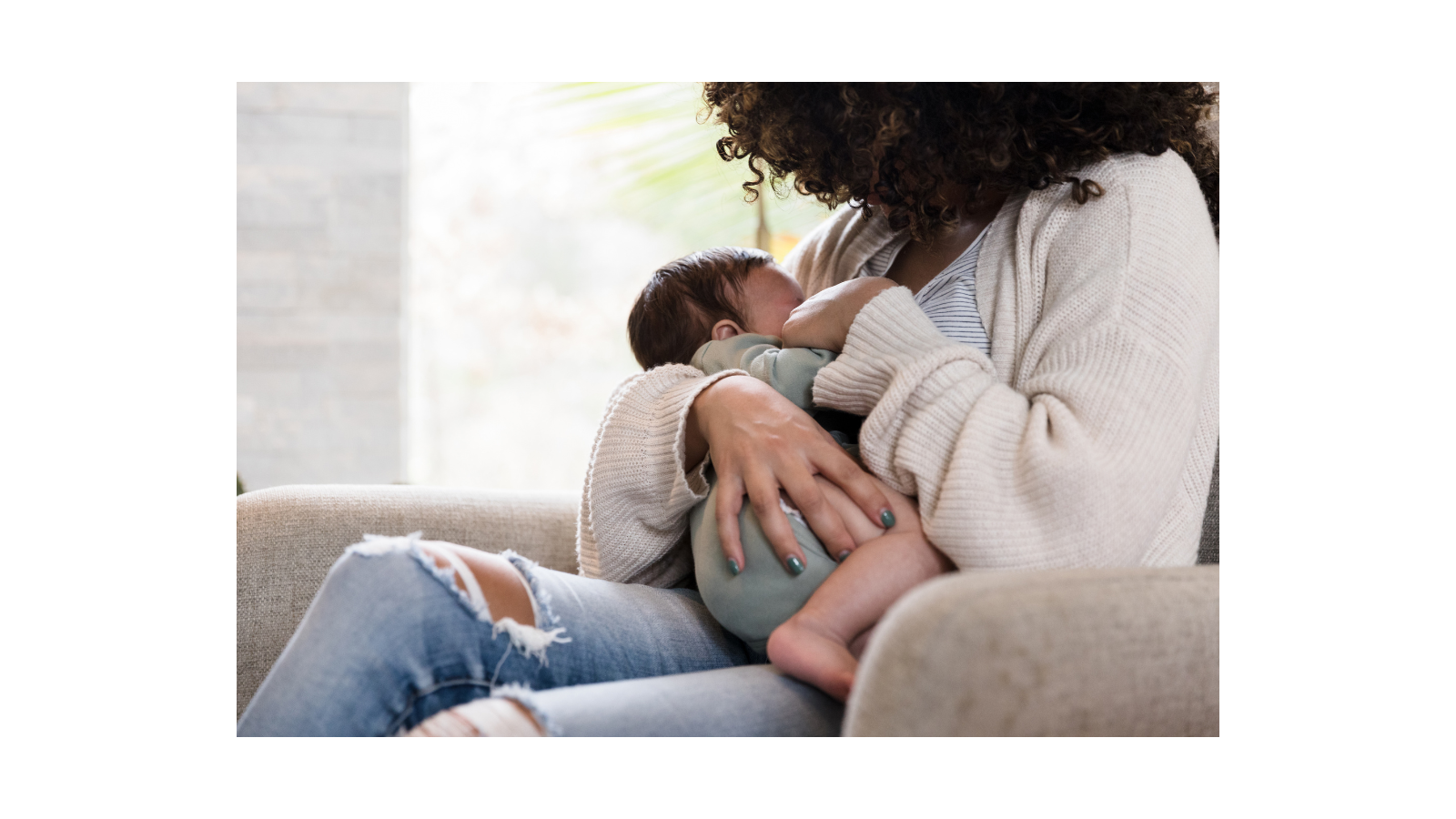Following the birth of your baby
Safer sleeping
It's not known why some babies die suddenly and for no apparent reason from sudden infant death syndrome (SIDS), or cot death.
How to Reduce the Risk of SIDS
To reduce the risk of SIDS:
- place your baby on their back to sleep, in the same room as you, for the first 6 months
- keep your baby's head uncovered – their blanket should be tucked in no higher than their shoulders
- if wearing your baby in a sling or carrier, do not cover their head with the sling material or with a muslin
- place your baby in the "feet to foot" position, with their feet at the end of the cot or Moses basket
- do not let your baby get too hot or cold
- never sleep with your baby on a sofa or armchair
- do not smoke during pregnancy or breastfeeding, and do not let anyone smoke in the same room as your baby.

Place your baby on their back to sleep
Place your baby on their back to sleep from the very beginning for both day and night sleeps. This will reduce the risk of cot death. Do not put your baby to sleep on their side or tummy.
Once your baby is old enough to roll over, there's no need to worry if they turn onto their tummy or side while sleeping.
Do not let your baby’s head become covered
Babies whose heads are covered with bedding are at an increased risk of SIDS.
To prevent your baby wriggling down under the covers, place them in the "feet to foot" position. This means their feet are at the end of the crib, cot or Moses basket.
To put your baby in the feet to foot position:
- tuck the covers in securely under your baby's arms so they cannot slip over their head – use 1 or more layers of lightweight blankets
- use a baby mattress that's firm, flat, well-fitting, clean and waterproof on the outside – cover the mattress with a single sheet
- do not use duvets, quilts, baby nests, wedges, bedding rolls or pillows
- If you use a sling or carrier, make sure you use it safely.
Do not let your baby get too hot or cold
Overheating can increase the risk of SIDS. Babies can overheat because of too much bedding or clothing, or because the room is too hot.
- When you check your baby, make sure they're not too hot. If your baby is sweating or their tummy feels hot to the touch, take off some of the bedding. Do not worry if their hands or feet feel cool – this is normal.
- It's easier to adjust for the temperature by using layers of lightweight blankets. Remember, a folded blanket counts as 2 blankets. Lightweight, well-fitting baby sleeping bags are a good choice, too.
- Babies do not need hot rooms. All-night heating is rarely necessary. Keep the room at a temperature that's comfortable – about 16 to 20C is ideal.
- If it's very warm, your baby may not need any bedclothes other than a sheet.
- Even in winter, most babies who are unwell or feverish do not need extra clothes.
- Babies should never sleep with a hot water bottle or electric blanket, next to a radiator, heater or fire, or in direct sunshine.
- Babies lose excess heat through their heads, so make sure their heads cannot be covered by bedclothes, slings or carriers while they're asleep.
- Remove hats and extra clothing as soon as you come indoors or enter a warm car, bus or train, even if it means waking your baby.
Be safe if you share a bed with your baby
If you share a bed with your baby (co-sleeping), you should:
- make sure they sleep on a firm, flat mattress lying on their back
- not have any pillows or duvets near them
- not have other children or pets in the bed at the same time
It's important not to share a bed with your baby if they had a low birthweight (less than 2.5kg or 5.5lb) or if you or your partner:
- smoke (no matter where or when you smoke and even if you never smoke in bed)
- have had 2 or more units of alcohol
- have taken recreational drugs
- have taken medicine that causes drowsiness
Never sleep with a baby on a sofa or an armchair
It's lovely to have your baby with you for a cuddle or a feed, but sleeping with your baby on a sofa or armchair is linked to a higher risk of SIDS.
It's safest to put your baby back in their cot before you go to sleep.
Do not let anyone smoke near your baby
Babies exposed to cigarette smoke before and after birth are at an increased risk of SIDS. Do not let anyone smoke in the house, including visitors.
Ask anyone who needs to smoke to go outside. Do not take your baby into smoky places. If you smoke, sharing a bed with your baby increases the risk of cot death.
Feeding, Dummies and SIDS
Breastfeeding your baby reduces the risk of SIDS. It's possible using a dummy at the start of a sleep also reduces the risk of SIDS. But the evidence is not strong and not all experts agree that dummies should be promoted.
If you do use a dummy, do not start until breastfeeding is well established. This is usually when your baby is around 1 month old.
Stop giving them the dummy when they're between 6 and 12 months old.
Useful links
- Safer sleeping - Reducing the risk of sudden infant death
- Click here for safer sleeping guidelines and resources
Breastfeeding

It’s never too early to start thinking about how you are going to feed your baby. Breastfeeding gives your baby the best possible start in life as it has lots of benefits for both you and your baby that last a lifetime
Your breastmilk is the only food designed for your baby. It contains everything your baby needs for around the first six months of life. After that, giving your baby breastmilk along with solid food will help them continue to grow and develop. The World Health Organization recommends breastfeeding for two years or longer.
- Breastfeeding protects your baby from various infections and diseases. It also offers health benefits for mums. Every day makes a difference to your baby, as the longer you breastfeed, the longer the protection lasts. Formula milk cannot provide your baby with the same ingredients or give the same protection.
- Breastfeeding helps build a strong bond between mother and baby, both physically and emotionally.
- Breastfeeding reduces the risk of sudden infant death.
Just like any new skill, breastfeeding may take time and practice to work. In the first few days, you and your baby will be getting to know each other. Close contact and holding your baby against your skin can really help with this. The more time you spend with your baby, the quicker you will learn to understand each other’s signs and signals. The next few pages will help you to understand how breastfeeding works. And remember, it’s OK to ask for help.
Midwives, health visitors, trained volunteers and peer supporters can all offer advice and practical help with breastfeeding. Peer supporters are mothers who have breastfed their own babies and have had training to help them support other mothers. Talk to your midwife or health visitor about the help that is available in your area.
Try not to give your baby a dummy until breastfeeding is established, usually when your baby is about a month old. Using dummies has been shown to reduce the amount of breastmilk that is produced. If your baby becomes accustomed to using a dummy while sleeping, it should not be stopped suddenly in the first six months. Try to reduce using the dummy by the time your baby is 6-9 months old as it may affect the development of the baby’s teeth and speech.
Useful links
- Off to a Good Start book
- Breastfeeding and returning to work leaflet
- Chapter 10 – Breastfeeding – The Pregnancy book
- Breastfed babies - https://www.breastfedbabies.org/
